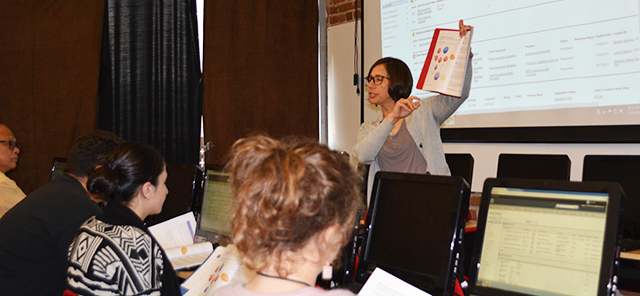“The price of light is less than the cost of darkness.”
–Arthur C. Nielsen, market researcher and founder of ACNielsen
The need and challenge
Michelle Reiss-Top (photo, top right) definitely understands the aforementioned quote about data. MEDA’s technology and data systems manager was tasked with implementing and optimizing Salesforce internally–a Herculean task by itself. Imagine then being asked to do so for a cadre of neighborhood partners.
Good thing Reiss-Top showcases over 12 years experience implementing systems and making processes more efficient, user friendly and economical. This is complemented by her experience in the nonprofit and human services arena, with a focus on bringing innovative technology to the service providers of San Francisco’s Mission District.
The latest challenge for the Salesforce expert was to bridge the data-collection gap among service providers of the Mission Promise Neighborhood (MPN), a citywide community partnership with the goal of ensuring that every Mission District family is economically prosperous, and that every child succeeds in school and graduates from college. MEDA serves as lead agency of this federal initiative.
Reiss-Top was aware that there was no cookie-cutter application for data sharing among 11 MPN partners. MEDA Evaluator Elisa Baeza had the laborious assignment of standardizing partner data she collected. These data were in Excel files, but no style guide had ever been created, leading to fellow MEDA Evaluator Severin Saenz having to always clean up files for consistency (e.g., dates being entered in a consistent manner). The information would then be sent to the U.S. Department of Education, with the biggest drawback being that partners would never see what other organizations were doing and which clients they were jointly serving.
The outcome
The good news is that with the completion of this intensive, four-month project, consistent data collection has become a reality.
The other good news is that there are now important insights provided by these partner data that have been collected. Take the case of MPN partner Mission Graduates, which assists high schoolers in being college ready via mentorships. The organization can now see if the student’s parents have or have not accessed other neighborhood services relating to family economic success.
On a grand scale, information can now be garnered on the status of approximately 600 MPN families. The MPN team can now also know how many clients are being served by multiple agencies, plus how much time these families are spending accessing various services. Later, there will be matching of these data with students’ school outcomes. There are built-in security measures to protect client confidentiality.
There had some initial forays into the world of data sharing among partners. Explains Reiss-Top of the lessons learned from these attempts: “The MEDA evaluation team learned some valuable lessons. The first thing we did was develop a questionnaire for partners to learn the data-collecting reality at each organization. We asked what’s missing and what would add value. This was imperative.”
Each partner’s data coordinator receives training at MEDA. The initial training was held last Thursday in Plaza Adelante’s computer lab. Training topics include: avoiding duplicate records; quickly replicating service records; a holistic view of a household’s services and needs; reports, dashboards and ways to request more analysis and support.
As a reference tool, Reiss-Top has created a comprehensive, 44-page manual. There will later be a one-on-one training from a MEDA evaluation team member at the partner’s office, using that organization’s data.
“MPN’s hope is that each organization will find synergy with a number of partners. We have 100 community member licenses for partner users of different types. A ‘light’ user, like an executive director, can access reports. A program manager can quickly communicate with the community to share resources or expertise. This is a powerful tool. The partners at our first demo clapped when they saw their services and clients on a dashboard!” concludes an enthusiastic Reiss-Top.






